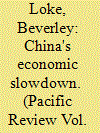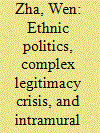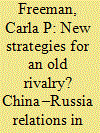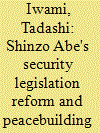|
|
|
Sort Order |
|
|
|
Items / Page
|
|
|
|
|
|
|
| Srl | Item |
| 1 |
ID:
161564


|
|
|
|
|
| Summary/Abstract |
China's spectacular economic growth over the past decades has given rise to a more confident and proactive China in global governance. China is now an institution-builder, with new Chinese-led institutions such as the Asian Infrastructure Investment Bank designed to cement Beijing's central role in global economic governance. What, then, are the potential implications of a slowing economy for China's institutional power and global governance role? This article locates China's economic growth and slowdown in broader discussions about China's global position and questions about responsibility, order and governance. It argues that China's economic slowdown will not result in a drastic impact on Beijing's institutional power as there are key material, historical and ideational drivers at play here. Unless China is confronted with the prospect of an economic collapse, it will continue to pursue an active institutional role, speak the rhetoric of South–South solidarity with emerging economies and seek a leadership role in reforming global economic governance, even with a slowing economy, because this is intrinsically tied to its identity and how China now positions itself in an evolving global order.
|
|
|
|
|
|
|
|
|
|
|
|
|
|
|
|
| 2 |
ID:
161558


|
|
|
|
|
| Summary/Abstract |
Despite the emergence of a rich literature on the rise of China in Latin America (LAC) since 2000, we are still grappling with this phenomenon. In this article we seek to theorize this expanding South–South relationship from two vantage points. First, from the perspective of China, we argue that, by necessity, the PRC has had to internationalize its development strategy in order to compensate for its serious natural resource deficit, feed the world's largest domestic population, and fuel the soon-to-be largest economy in the world. LAC has been just one slice of China's ‘go out’ strategy. Our second perspective probes the effect of China's entry into the region. Through the lens of development economics, we identify three separate political economy scenarios that have been accentuated within those countries that have the strongest economic ties with China. We rely on measures of institutional performance and macro-economic trends to illustrate the variable effects of China on LAC.
|
|
|
|
|
|
|
|
|
|
|
|
|
|
|
|
| 3 |
ID:
161560


|
|
|
|
|
| Summary/Abstract |
This article examines ethnic conflict and its impacts on intramural relations within the Association of Southeast Asian Nations (ASEAN). It suggests that ethnic politics at home often propels leaders to get involved in ethnic conflict elsewhere. In the ASEAN context, regional institutions, especially the principle of non-interference, mitigate the effects of ethnic politics and preclude the possibility of coercive intervention. The third state is more likely to appeal to facilitation or mediation. On the side of the host state, when the regime faces complex legitimacy crisis, it is more likely to reject the third state's involvement. Ethnic conflict is likely to cause diplomatic tussles between the two states. In contrast, when the regime of the host state enjoys a higher level of legitimacy, it is more amenable to the third party's mediation. Cooperation on conflict management will foster inter-state trust. This article illustrates the above mechanism by examining Malaysia's role in Thailand and the Philippines’ ethnic insurgencies.
|
|
|
|
|
|
|
|
|
|
|
|
|
|
|
|
| 4 |
ID:
161559


|
|
|
|
|
| Summary/Abstract |
Existing theories on real exchange rates predict a significant undervaluation of the Korean won (KRW) in the early and mid-1990s. The paper demonstrates why this expectation did not materialize and instead an unprecedentedly large degree of overvaluation took place. Focusing on three variables, namely, financial repression, devaluation pass-through, and policy exhibitionism, the paper examines how the unraveling of the developmental state eventually gave rise to the 1990s’ overvaluation. It argues that the policy exhibitionism of the new civilian government amplified the influence of Chaebol on monetary policies, which in turn created a strong appreciative force to KRW. It also contends that the increasing exchange rate pass-through onto the prices of imported intermediate goods explains why Chaebol did not desire to tame the excessive appreciative trend despite its detrimental effect on their exports. The paper offers policy implications for other state-led, emerging economies.
|
|
|
|
|
|
|
|
|
|
|
|
|
|
|
|
| 5 |
ID:
161562


|
|
|
|
|
| Summary/Abstract |
China and Russia both have interests in bordering Central Asia. China's thirst for energy has seen its footprint expand rapidly in the region relative to that of Russia, Central Asia's historical hegemon. With the two powerful neighbors’ history of competition and conflict, the shift in relative influence between them risks a resurgence of bilateral rivalry. Referencing the scholarly literature on strategic rivalry, this article examines how energy relations have helped shaped the trajectory of China-Russian relations in Central Asia, particularly after the shock that came with the collapse of oil and gas prices in 2008–2009.
|
|
|
|
|
|
|
|
|
|
|
|
|
|
|
|
| 6 |
ID:
161561


|
|
|
|
|
| Summary/Abstract |
Recent literature on Japanese foreign policy has focused on analysing the implications of Prime Minister Shinzo Abe's security legislation reform for the bilateral security alliance relationship with the US amidst a rising China and the right to collective self-defence. Its impact on Japan's multilateral security policy, in particular, peacebuilding, has so far received little attention. In what ways and to what extent does Japan play a peacebuilding role under this change? This article examines key implications of the security legislation reform, along with the renewal of Japan's Official Development Assistance charter, for its peacebuilding efforts. By taking Mindanao, the Philippines, as a case study, it argues that Abe focuses on taking a foreign aid-centred approach while showing little interest in sending Japanese Self-Defence Force. This article provides a counter-narrative to the claim that Japan is taking a more assertive approach to international security. Abe is more risk-averse as far as his approach to peacebuilding is concerned.
|
|
|
|
|
|
|
|
|
|
|
|
|
|
|
|
| 7 |
ID:
161563


|
|
|
|
|
| Summary/Abstract |
Why do conservative nationalists in Japan continuously seek to revise the constitution despite the past failures, and what is the likelihood of successful revision and its impact on Japan's norm of pacifism and its use of force? The article offers an analytical framework for the issue based on national pride and national security, and argues that the ‘revisionists’ seek to create a new national identity, one that infuses a greater sense of national pride among the public and enables the exercise of collective self-defense, thereby removing Japan's postwar psychological and institutional limitations on nationalism and military activities. The LDP's 2012 draft is most explicit and ambitious in this regard, with the current revision attempt under Abe having the highest chance of success since the 1950s. Successful revision would significantly expand Japan's security activities, particularly within the framework of the US–Japan Security Alliance, and entail the end of Japan's unique postwar institutionalized pacifism, although the norm of pacifism will linger on as a constitutional principle. For a smoother return to the international military scene, the Japanese government must distance itself from historical revisionism and utilize its enhanced military role to promote regional public goods rather than merely protecting its narrow national interests.
|
|
|
|
|
|
|
|
|
|
|
|
|
|
|
|
|
|
|
|
|